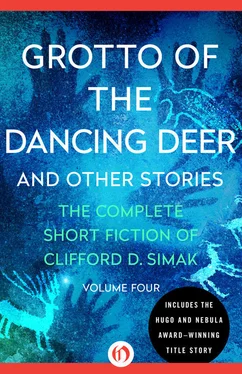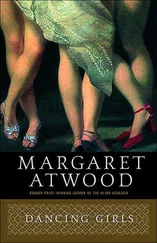“All right,” snarled Hart. “Now you get out of my sight before I lose control of myself. You get out to Venus just as soon as a space eater can get you there—and so help me Hannah, if you flunk out on this assignment I’ll put you on the obituary desk and what’s more, by the Lord Harry, I’ll see that you stay there.”
Outside the door, Bob gave himself a mental kicking.
“You damn fool,” he told himself, “you should have made it ten thousand. He’d have paid it just as quick.”
II
Zeke Brown sat disconsolately on the chopping block in front of his weather-beaten cabin and watched his neighbor, Luther Bidwell, come down the road.
Luther was a nondescript figure. Clad in blue denim overalls, he bore an unshaven and unwashed look. His ragged hat sagged over a shock of disordered hair, hanging halfway to his shoulders. His gait was a half slouch, half gallop, as if he might be in a hurry, but didn’t want anyone to think he was.
Zeke hailed him from a distance.
“Howdy, Luther.”
“Howdy, Zeke,” Luther called back.
Zeke waited, smoking his pipe, his eyes sweeping the pitiful failure and delusion of his Venusian farm. The fields covered by huge patches of polka-dot weeds, the encroaching jungle, the rusting machinery, the steaming pools of water drowning out the last of his stand of corn. From the jungle came the high-pitched chirping of the dingbats, insects which in their own proper time would come forth to devour whatever might be left in the fields.
Something rustled in a clump of polka-dot weeds near the wood pile and Zeke, turning swiftly, saw a pair of pointed ears and two gleaming eyes staring at him. With a swift motion he whipped out the gun which dangled from the belt at his hip. But before he could clear the weapon the evil face had disappeared.
“Dang you,” said Zeke without emphasis, “just stick your head out again. I’ll get you.”
But the skink was gone. Zeke grumbled and holstered his gun.
Turning his eyes back to the road, he watched Luther continue down the trail, raising little spurts of mud as his feet clopped on the ground. Luther turned in at the sagging gate and took a seat beside Zeke.
“Just saw you pull your gun,” he commented. “See something?”
“A skink,” said Zeke. “Dang things overrunning the place. Just about cleaned out the chickens. Just a few old hens left now.”
“They cleaned me out the other night,” Luther said. “Killed every hen on the place and then got into the hog pen. Tackled the hogs, I guess, but them porkers was too much for them. Must of been quite a herd of them at that, for they chawed some of them pigs up right handsome. The hogs killed a couple of them and I ain’t been able to go into that hog house since then. They sure carry a powerful scent, them fellers. Worse than the polecats back in Iowa. Hogs don’t mind, seems. They ate ‘em.”
“They give me the creeps,” said Zeke. “Almost like human beings running around on all four legs. Naked, not a single hair on them and meaner than poison. If you get them mad, they’ll go around stinking up a place just out of pure orneriness, like they was trying to get even. But I cleared quite a few of them out of this neck of the woods lately.”
He patted the gun at his side.
“But you know what I’d like best of all, Luther?” Zeke asked.
“Nope,” said Luther.
“I’d like to catch up with that slick land agent. I would sure burn his hide full of fancy holes. He’s the feller I’d really like to get in front of this gun. But he’s still back on Earth. He knew dang well that after he got us out here on Venus we couldn’t ever get back to Earth.
“Remember the things he told us? He talked slick as all get out when he came to our little place back in Iowa. Told us about all the advantages there were on Venus for a progressive farmer. He sure painted a pretty picture. He said there wasn’t no winter here and that a feller could grow four or five crops a year. He said there was always plenty of rainfall. He was plumb full of talk about the virgin soil of Venus, how it had never been plowed and was just waiting to grow bumper crops and make us all rich. And how there’d always be a big market for everything we grew because the farms were right on the edge of New Chicago. Remember how he told us New Chicago was going to be a big city and the folks there would be willing to pay high prices for the stuff we grew?”
“Sure I remember it,” said Luther. “He told me the same thing. So me and Ma talked it over and we decided to come out here. After all, we figured Venus had been colonized for over 300 years and was getting pretty civilized. Sounded pretty good to me, I admit. Matter of fact, soil was getting mighty puny back on Earth. Even good old Iowa soil. Just about all the good drained out of it and all cut up by ditches. You can’t farm the same land for over five thousand years without taking proper care of it and still expect the crops to grow the way they ought to.”
The skink stuck its head out of the clump of weeds beside the wood pile again and Zeke swore sulphurously as it disappeared before he could clear his gun.
“Dang you, I’ll get you yet,” he shouted, waving the gun. From the wood pile came the sneering chittering of the animal.
Zeke holstered his gun and stuffed his pipe with a fresh load of Venusian tobacco.
“But there was a lot of things that feller didn’t tell us, Luther,” he said. “He didn’t tell us that this planet was full of all sorts of wild animals and birds and that it had reptiles ten times as poisonous as rattlers. And that it had a billion different kinds of bugs, all ornery as hell. He said there was plenty of rainfall—but he didn’t tell us there was so much that it would drown out our crops. He didn’t say a dang thing about the dingbats that eat up every green thing in sight when the hunger comes on them and he plumb forgot to mention the elephant-lizards that can tramp down a field of corn quicker than you can blink your eye. He didn’t tell us it was so damp all our machinery would rust and not make even good scrap iron.”
Luther spat disgustedly and added his words to the indictment.
“And not a word did that slicker tell us of what kind of a city New Chicago was. He told us it was a growing city, which was stretching the truth a dang sight farther than the law allows. A stinking little trading post with just a few stores and saloons and a couple of hell-joints for the hunters and prospectors and traders who come to town once or twice a year. He said there’d be a market for our stuff. Of course, that doesn’t matter much, because we ain’t had nothing to sell. We been here five years and ain’t had a thing to sell all that time. We’re lucky if we have eating for ourselves.”
“Been eating on wild game and jungle fruit and greens ourselves for the past month,” said Zeke.
“We got a little flour and some sugar over at our house,” offered Luther. “Not much, but be glad to divvy up with you.”
Zeke shook his head.
“No,” he said. “You keep it. You got young ones and they need it. There’s just the old woman and me. We’ll get along. We been a pack of fools, Luther, and I lay awake nights trying to figure out what to do about it. But there don’t seem no way. We couldn’t raise money enough among the whole fifty families of us to buy even one ticket back to Earth. If we could do that, one of us might go back and see if somebody couldn’t help us. But I guess we just been a bunch of suckers, that’s all.”
Luther sighed.
“Wish I was back in Iowa,” he said.
III
“Nope,” rumbled Doc, “I can’t tell you a thing about it. Don’t even know what this Hunger Disease is, except for what you told me just now. First I ever heard of it was when that newspaperman from Radium City called me up about it.”
Читать дальше












